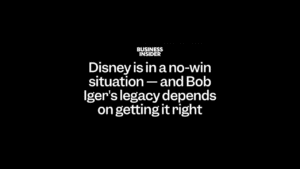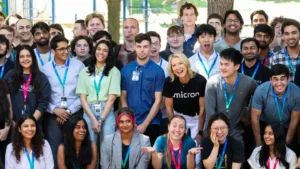Profiles in Leadership | NASA Flight Director Courtenay McMillan
This video profiles former NASA Flight Director Courtenay McMillan, who recently served as the Manager of Mission Integration & Operations for the International Space Station (ISS) program. The video explores the importance of leaders being open to rethinking decisions when new data is presented and how leaders manage uncertainty and crises.

About this Profile in Leadership
Courtenay McMillan
- McMillan is seasoned NASA Flight Director and currently serves as the Manager of Mission Integration & Operations for the International Space Station (ISS) Program. In this role, she oversees the integration of various mission elements and ensures the seamless operation of the ISS, managing coordination between multiple teams and systems to support ongoing space missions.
- McMillan has been with NASA since 1996, after earning her Bachelor’s degree in Aerospace Engineering from Penn State University in 1992. Her career spans various leadership and technical positions, including as a Flight Director since 2007, where she has been instrumental in leading critical ISS operations and emergency response strategies.
- One of her notable achievements was establishing NASA’s flight control operations in Moscow for the ISS, which enhanced international collaboration on space missions. Known for her leadership in high-pressure situations, McMillan continues to play a vital role in the success of human spaceflight missions.
The Apollo 1 Fire
- The Apollo 1 fire occurred on January 27, 1967, during a pre-launch test for what was intended to be the first crewed Apollo mission. Astronauts Gus Grissom, Ed White, and Roger B. Chaffee were conducting a routine systems check inside the Command Module when a fire suddenly broke out. The pure oxygen environment inside the spacecraft, combined with flammable materials, caused the fire to spread rapidly. Tragically, all three astronauts perished as they were unable to open the hatch in time. The incident was a devastating setback for NASA’s Apollo program but led to major design overhauls, including improvements in spacecraft materials, hatch mechanisms, and safety protocols. The lessons learned from the Apollo 1 fire were critical in the eventual success of the Apollo missions, culminating in the Moon landing in 1969.
The Columbia Shuttle Accident
- The space shuttle Columbia accident occurred on February 1, 2003, during the re-entry of Space Shuttle Columbia after a 16-day scientific mission (STS-107). A piece of foam insulation had broken off from the external fuel tank during launch, striking the shuttle’s left wing and damaging its heat shield. This damage went unnoticed during the mission, and upon re-entry into Earth’s atmosphere, the compromised heat shield allowed superheated atmospheric gases to penetrate the wing, leading to the shuttle’s disintegration. All seven astronauts on board—Rick Husband, William McCool, Michael Anderson, Ilan Ramon, Kalpana Chawla, David Brown, and Laurel Clark—tragically lost their lives. The disaster prompted a two-year suspension of shuttle flights and a comprehensive investigation that led to significant changes in NASA’s safety culture and procedures, ultimately improving the safety of future space missions.
Courtenay McMillan
- McMillan is seasoned NASA Flight Director and currently serves as the Manager of Mission Integration & Operations for the International Space Station (ISS) Program. In this role, she oversees the integration of various mission elements and ensures the seamless operation of the ISS, managing coordination between multiple teams and systems to support ongoing space missions.
- McMillan has been with NASA since 1996, after earning her Bachelor’s degree in Aerospace Engineering from Penn State University in 1992. Her career spans various leadership and technical positions, including as a Flight Director since 2007, where she has been instrumental in leading critical ISS operations and emergency response strategies.
- One of her notable achievements was establishing NASA’s flight control operations in Moscow for the ISS, which enhanced international collaboration on space missions. Known for her leadership in high-pressure situations, McMillan continues to play a vital role in the success of human spaceflight missions.
The Apollo 1 Fire
- The Apollo 1 fire occurred on January 27, 1967, during a pre-launch test for what was intended to be the first crewed Apollo mission. Astronauts Gus Grissom, Ed White, and Roger B. Chaffee were conducting a routine systems check inside the Command Module when a fire suddenly broke out. The pure oxygen environment inside the spacecraft, combined with flammable materials, caused the fire to spread rapidly. Tragically, all three astronauts perished as they were unable to open the hatch in time. The incident was a devastating setback for NASA’s Apollo program but led to major design overhauls, including improvements in spacecraft materials, hatch mechanisms, and safety protocols. The lessons learned from the Apollo 1 fire were critical in the eventual success of the Apollo missions, culminating in the Moon landing in 1969.
The Columbia Shuttle Accident
- The space shuttle Columbia accident occurred on February 1, 2003, during the re-entry of Space Shuttle Columbia after a 16-day scientific mission (STS-107). A piece of foam insulation had broken off from the external fuel tank during launch, striking the shuttle’s left wing and damaging its heat shield. This damage went unnoticed during the mission, and upon re-entry into Earth’s atmosphere, the compromised heat shield allowed superheated atmospheric gases to penetrate the wing, leading to the shuttle’s disintegration. All seven astronauts on board—Rick Husband, William McCool, Michael Anderson, Ilan Ramon, Kalpana Chawla, David Brown, and Laurel Clark—tragically lost their lives. The disaster prompted a two-year suspension of shuttle flights and a comprehensive investigation that led to significant changes in NASA’s safety culture and procedures, ultimately improving the safety of future space missions.
- Resilience and Adaptability in Decision-Making: Courtenay McMillan emphasized the importance of leaders being open to rethinking decisions when new data is presented. In business, this translates to flexibility in leadership and the ability to pivot when faced with changing market conditions.
- Leadership Under Pressure: Managing crises in real time requires calm, composed decision-making. In business, this applies to handling corporate crises or market disruptions, where setting the right tone is essential.
- Simulations as Training for Leadership: Just as NASA uses simulations to train teams for unexpected challenges, businesses can use scenario-based training and contingency planning to prepare teams for crises and rapid changes.
- Mentorship and Continuous Learning: McMillan’s role as a mentor to flight controllers parallels the importance of mentoring in business organizations. Leaders must provide honest, constructive feedback to help their teams grow.
- Tough and Competent Leadership: Gene Kranz’s speech following the Apollo 1 fire emphasizes the importance of leaders being both “tough and competent.” This speech demonstrates how a strong, clear message can unify and motivate teams.
- Resilience and Adaptability in Decision-Making: Courtenay McMillan emphasized the importance of leaders being open to rethinking decisions when new data is presented. In business, this translates to flexibility in leadership and the ability to pivot when faced with changing market conditions.
- Leadership Under Pressure: Managing crises in real time requires calm, composed decision-making. In business, this applies to handling corporate crises or market disruptions, where setting the right tone is essential.
- Simulations as Training for Leadership: Just as NASA uses simulations to train teams for unexpected challenges, businesses can use scenario-based training and contingency planning to prepare teams for crises and rapid changes.
- Mentorship and Continuous Learning: McMillan’s role as a mentor to flight controllers parallels the importance of mentoring in business organizations. Leaders must provide honest, constructive feedback to help their teams grow.
- Tough and Competent Leadership: Gene Kranz’s speech following the Apollo 1 fire emphasizes the importance of leaders being both “tough and competent.” This speech demonstrates how a strong, clear message can unify and motivate teams.
- Translate high-stakes leadership lessons to business environments: Students will explore how leaders manage uncertainty and crises, applying NASA’s Mission Control leadership model to business and organizational settings.
- Examine adaptability and resilience in decision-making: Understand how leaders in both business and mission-critical environments must adapt to new data and evolving circumstances.
- Analyze leadership strategies for team dynamics and support: Investigate how NASA’s leadership strategies in managing remote teams can apply to managing distributed teams in business settings.
- Develop skills in giving and receiving feedback: Learn how continuous learning and candid feedback contribute to leadership growth in both space missions and business organizations.
- Study Gene Kranz’s ‘Tough and Competent’ Speech: Understand the importance of setting a strong leadership tone during crises and explore how this speech can inform business leadership in tough times.
- Translate high-stakes leadership lessons to business environments: Students will explore how leaders manage uncertainty and crises, applying NASA’s Mission Control leadership model to business and organizational settings.
- Examine adaptability and resilience in decision-making: Understand how leaders in both business and mission-critical environments must adapt to new data and evolving circumstances.
- Analyze leadership strategies for team dynamics and support: Investigate how NASA’s leadership strategies in managing remote teams can apply to managing distributed teams in business settings.
- Develop skills in giving and receiving feedback: Learn how continuous learning and candid feedback contribute to leadership growth in both space missions and business organizations.
- Study Gene Kranz’s ‘Tough and Competent’ Speech: Understand the importance of setting a strong leadership tone during crises and explore how this speech can inform business leadership in tough times.


